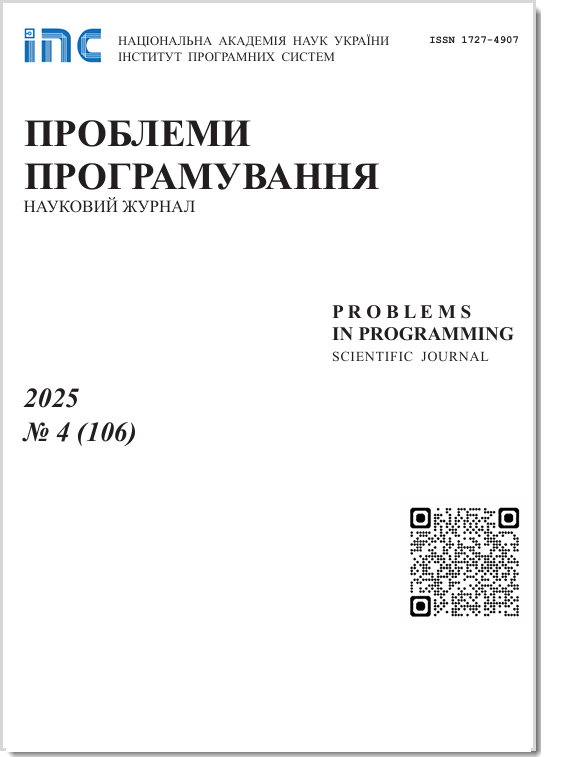Development of domain thesaurus as a set of ontology concepts with use of semantic similarity and elements of combinatorial optimization
Abstract
We consider use of ontological background knowledge in intelligent information systems and analyze directions of their reduction in compliance with specifics of particular user task. Such reduction is aimed at simplification of knowledge processing without loss of significant information. We propose methods of generation of task thesauri based on domain ontology that contain such subset of ontological concepts and relations that can be used in task solving. Combinatorial optimization is used for minimization of task thesaurus. In this approach, semantic similarity estimates are used for determination of concept significance for user task. Some practical examples of optimized thesauri application for semantic retrieval and competence analysis demonstrate efficiency of proposed approach.
Prombles in programming 2021; 2: 03-15
Keywords
Full Text:
PDFReferences
Gruber T. R. A translation approach to portable ontology specifications. Knowledge Acquisition 5, (1993), pp. 199-220.
Kleshche A., Artemjeva I. A Structure of Domain Ontologies and their Mathematical Models. URL: www.iacp.dvo.ru/es/.
Gladun A., Rogushina J. Mereological Aspects of Ontological Analysis for Thesauri Constructing. In Buildings and the Environment, Nova Science Publishers. (2010), pp. 301-308.
The differences between a vocabulary, a taxonomy, a thesaurus, an ontology, and a metamodel. URL: www.metamodel.com/article.php story=20030115211223271.
Matthews B.M., Miller K., Wilson M.D. A Thesaurus Interchange Format in RDF. – URL: www.limber.rl.ac.uk/External/SW_conf_thes_paper.htm.
Thesaurus Links URL:https://www.w3.org/2001/sw/Europe/reports/thes/thes_links.html
Lassila O., McGuinness D. The role of framebased representation on the semantic web. Linköping Electronic Articles in Computer and Information Science, 6(5), (2001).
Gladun, A., & Rogushina, J. Use of Semantic Web technologies in design of informational retrieval systems. In book Building and Environment, Nova Science Publishers, (2010), pp. 289-299. http://www.novapublishers.org/catalog/product_info.php cPath=23_67_742&products_id=10117
Gladun, A., & Rogushina, J. Use of Semantic Web technologies in design of informational retrieval systems. In book Building and Environment, Nova Science Publishers, (2010), pp. 289-299. URL: https://www.researchgate.net/profile/AnatolyGladun/publication/287721726
Gladun, A., & Rogushina, J. Distant control of student skills by formal model of domain knowledge. International Journal of Innovation and Learning, 7(4), (2010), pp. 394-411.
Use_of_semantic_web_technologies_in_design_of_informational_retrival_systems/links/569ff66c08ae4af52546d9cc/Use-of-semantic-web-technologies-in-design-of-informational-retrieval-systems.pdf.
Gladun A., Rogushina J."Distant control of student skills by formal model of domain knowledge". International Journal of Innovation and Learning, 7(4), (2010), pp. 394-411.
Rogushina J., Priyma S. Use of competence ontological model for matching of qualifications. Chemistry: Bulgarian Journal of Science Education, Volume 26, №2, (2017), pp. 216-228.
Kalfoglou Y., Schorelmmer M. "Ontology mapping: the state of the art." The Knowledge Engineering Review 18(1), (2003), pp. 1–31.
Gladun A., Rogushina J. Semantic search of Internet information resources on base of ontologies and multilinguistic thesauruses. Information Theories & Applications, Vol.14, (2007), pp. 48-55.
Timofieva N. On some approaches to estimating the optimal solution of combinatorial optimization problems, USiM, Control systems & computers, №3 (281). (2019), pp. 3–13. URL:doi.org/10.15407/csc.2019.03.003. (in Ukraininan).
Sergienko I., Kaspshitskaya M. Models and methods of solving combinatorial optimization problems on a computer. - К.:Naukova dumka, 1981, 281 p. (in Russian)
Sigal I., Ivanova A. Introduction to Discrete Application Programming: Models and Computing. algorithms.: M.: Fizmatlit, 2002, 237 p.
Korbut A., Finkelstein Yu.Discrete programming. - М .: Nauka, 1969. 368 p. (in Russian)
Kilincli Taskiran G., An Improved Genetic Algorithm for Knapsack Problems (Doctoral dissertation, Wright State University). 2010. URL: core.ac.uk/download/pdf/36754668.pdf.
Okulov S. Programming in algorithms. Binom. Laboratory of Knowledge, 2007. - ISBN 5-94774-010-9. (in Russian)
Martello S., Toth P. Knapsack problems: algorithms and computer implementations. John 15 Information Systems Wiley & Sons Ltd., 1990. - P. 29.50. - 296 p. ISBN 0-471-92420-2.
Burkov V., Gorgidze I., Lovetsky S. Applied problems of graph theory / ed. J. Gorgidze - Tbilisi: Computing Center of the USSR Academy of Sciences, 1974. 231 p. (in Russian)
Taieb M., Aouicha A. H., Hamadou M. B. "Ontology- based approach for measuring semantic similarity." Engineering Applications of Artificial Intelligence, 36, (2014), pp. 238-261.
Rada R., Bicknell E. Ranking documents with a thesaurus. JASIS, V.10(5), (1989), pp. 304-310.
Rada R., Mili H., Bicknell E., Blettner M. Development and application of a metric on semantic nets. IEEE transactions on systems, man, and cybernetics, 19(1), (1989), pp. 17-30.
Wu Z., Palmer M. Verbs semantics and lexical selection. Proceedings of the 32-nd Annual Meeting on Association for Computational Linguistics, ACL’94, Association for Computational Linguistics, Stroudsburg, PA, USA, (1994), pp. 133–138.
Richardson R., Smeaton A. F., Murphy J. Using WordNet as a knowledge base for measuring semantic similarity between words. Working paper CA-1294, Dublin City University, School of Computer AppUcations, Dublin, (1994).
Resnik P. Semantic Similarity in a Taxonomy: An Information-Based Measure and its Application to Problems of Ambiguity in Natural Language. Journal of Artificial Intelligence Research 11, (1999), pp. 95 130.
Rogushina J. Analysis of Automated Matching of the Semantic Wiki Resources with Elements of Domain Ontologies. International Journal of Mathematical Sciences and Computing (IJMSC), 3(3), (2017), pp. 50-58.
Rogushina J., Gladun A., Pryima S., Strokan O. Ontology-Based Approach to Validation of Learning Outcomes for Information Security Domain. CEUR Vol-2577, Selected Papers of the XIX International Scientific and Practical Conference "Information Technologies and Security", (2019), pp. 21-36. URL: ceur-ws.org/Vol-2577/paper3.pdf.
DOI: https://doi.org/10.15407/pp2021.02.003
Refbacks
- There are currently no refbacks.









